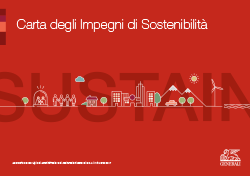This page contains Consolidated Non-Financial Statement information
We run our business in compliance with the law, internal regulations and professional ethics.

Running a sustainable business, pursuing excellence in our internal processes, and living the community, playing an active role where we operate, beyond our day-to-day business, represent our commitments to stakeholders and the society as a whole. We have renewed them in the Charter of Sustainability Commitments.
We have a collection of Group public policies and guidelines which support our operations in a sustainable and responsible manner, such as:
Code of Conduct that defines the basic behavioural principles which all the personnel of the Group are required to comply with: these principles are outlined in specific guidelines that refer, for example, to the promotion of diversity and inclusion as well as the management of conflicts of interest, personal data protection and corruption prevention
Group Policy for the Environment and Climate that contains the guiding principles for the strategies and objectives of environmental management
Responsible Investment Guideline that codifies the responsible investment activities at Group level
Responsible Underwriting Group Guideline that outlines principles and rules aimed at assessing environmental, social and governance features of the prospective and insured clients in the P&C underwriting process
Ethical Code for suppliers that highlights the general principles for the correct and profitable management of relations with contractual partners
www.generali.com/info/download-center/policies
Together, these Group policies and guidelines contribute to ensuring respect for human rights, a topic which we began to focus on in 2017. The goal is to identify, prevent and mitigate the main direct risks of human rights violations to which the Group is exposed, while also identifying areas and activities for improvement. In line with the principles and instruments in place at international level, a due diligence process was initiated to evaluate human rights on the basis of direct business risk and country risk, and also allowed for an initial assessment in countries with potentially greater exposure. The Group is defining a long-term action plan based on these results.
We also have a structured internal Group regulatory system, regulated by the Generali Internal Regulation System (GIRS) Policy. The Group regulations cover the internal control system and governance as well as the risk management system - in particular, linked to monitoring solvency (Solvency II) - in addition to the primary areas of financial and non-financial risk.
Corporate Governance and Share Ownership Report 2018
The primary compliance risks are monitored through specific programs spread throughout the Group.
We regularly monitor - by means of specific risk assessment activities - our exposure to these risks with the aim of minimizing potential reputational and economic damages deriving from the violation of regulatory provisions, including those which aim to prevent corruption.
We condemn and combat all forms of corruption and financial crime. We have made available communication channels (Group Compliance Helpline) to our employees, customers and suppliers, even in anonymous format, which ensure an objective and independent management of reports of behaviour or actions which might violate law, the Code of Conduct and the related Group Rules or other internal rules, in accordance with the Process on managing reported concerns and the whistleblowing policy which we have been applying for years. These channels are active 24 hours a day. We have also adopted a rigorous policy against retaliations.
www.generali.com/our-responsibilities/responsible-business/code-of-conduct per ulteriori informazioni sul Codice di Condotta e i canali di comunicazione
1 Compliance Week
Risk is no joke! Awareness is the key to managing risks in your daily activities. Your commitment is essential!
was the motto of the most recent edition of Compliance Week, during which the concept of risk was explored and the importance was underscored of providing the Group with an increasingly robust and effective Compliance Management System intended to prevent compliance risks. The role that every employee can play was emphasised throughout this prevention campaign
We are committing to rendering our HR training system increasingly effective.
We continue to work in activities for creating awareness and training on the different themes of the Code.
The implementation of specific training programs - both online as well as in the classroom - combined with a global communication program aims to create full awareness within all employees of the importance of the Code and their responsibility to report each violation that one becomes aware of. Everybody is encouraged to voice their concerns or request clarifications on any topic handled by the Code.
* The employees trained, also belonging to companies non-consolidated line-by-line, represent 80.3% of the total. The change is calculated at constant scope pursuant to IFRS 5.
